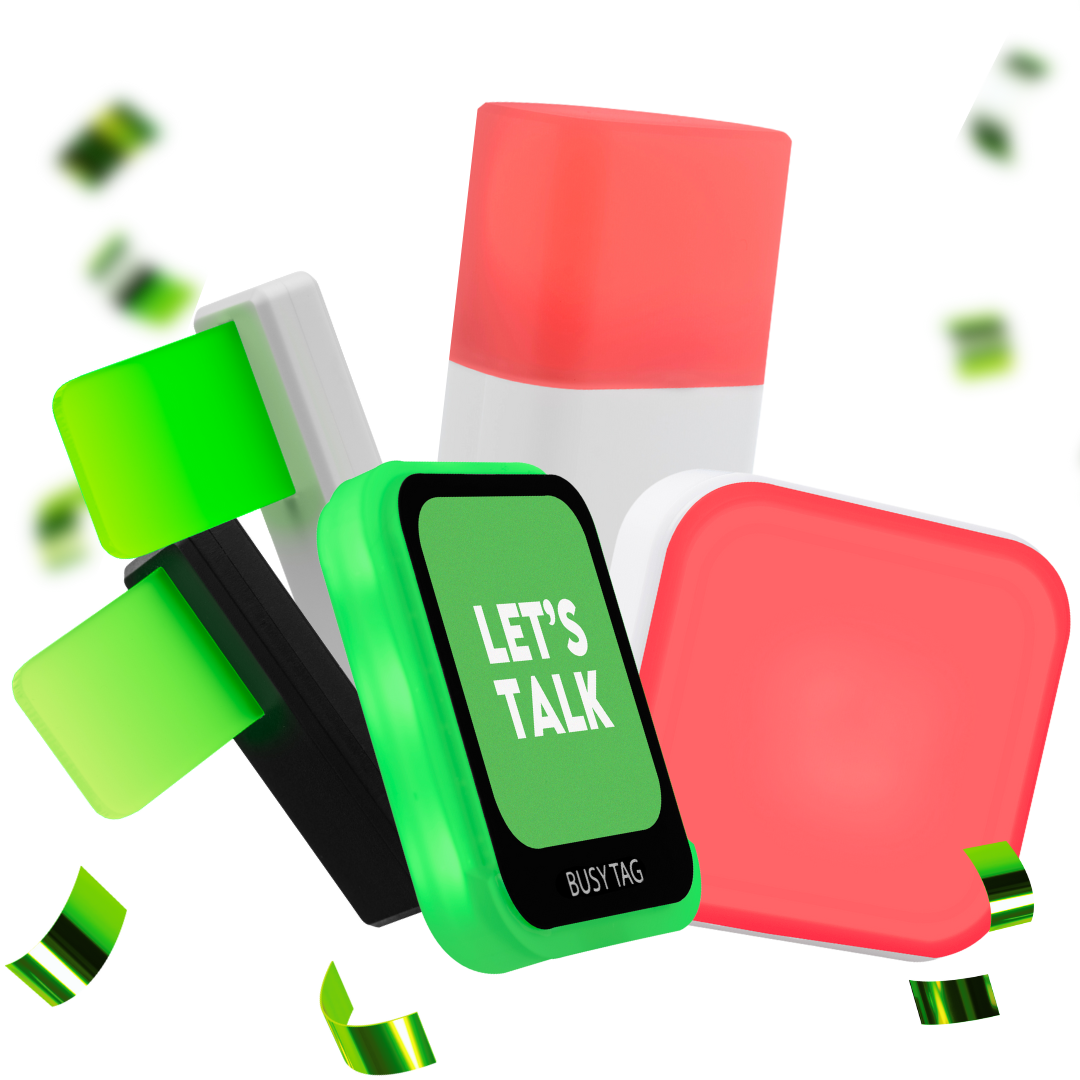Time Management for the Modern Age: Tips for Managing Distractions and Priorities
Feeling overwhelmed and unproductive at work? Wondering if there’s a better way to enhance your output while maintaining your well-being? You’re not alone. A study by the National Institute of Health highlights the importance of a pleasant work environment in retaining employees.
Productivity goes beyond sheer effort; it’s about working smartly. This study reveals that a pleasant work environment not only boosts happiness, but also significantly influences job satisfaction and career longevity.
Ready to elevate your workplace efficiency? You’re in the right place. This article explores 12 proven methods to create an efficient work environment. These strategies don’t just focus on achieving more; they aim to enhance your overall work experience, making your days more enjoyable and less stressful.
Want to structurize your routine and become more productive? Get your free PDF version of 30-60-90 Productuve Day Plan now!
Cultivate a Culture of Efficiency
Your workplace environment goes beyond the physical setting; it includes processes and the prevailing culture. To establish a culture of efficiency, consider these key strategies:
- Define clear goals. Establish specific and measurable goals that everyone understands.
- Set specific individual goals. Assign individual goals to each team member that contribute to the overall team goals.
- Foster teamwork. Encourage collaboration and communication between team members.
- Support breaks. Encourage team members to take regular breaks to recharge and stay effective.
- Embrace change. Be open to new ideas and changes to the office environment or routines.
- Provide necessary resources. Invest in the tools, resources, and education that your team needs to be successful.
Empower Your Team with Efficient Resources
Provide your workforce with essential resources to enhance productivity and address tool-related issues, especially those affecting computer performance, which can significantly impact workplace efficiency. In today’s knowledge-based work landscape, reliable computers are indispensable for seamless daily operations.
To achieve this, follow these tailored guidelines:
- Assess role-specific needs. Understand the unique requirements of each team member’s role.
- Focus on essential tools. Identify the core tools and software that are essential for daily operations.
- Conduct regular audits. Routinely assess hardware and software to ensure they are up-to-date and functioning properly.
- Promptly address performance issues, such as a slow PC, to enhance workflow, eliminate glitches, and maintain productivity.
- Customize software selections. Tailor software choices to match the specific needs of different teams or departments.
- Provide training and support. Offer training and support for efficient tool and software use.
- Implement collaboration tools. Introduce collaboration tools to help seamless communication and teamwork.
- Establish a feedback mechanism. Create a feedback mechanism for continuous tool effectiveness assessment and necessary adjustments.
- Stay technologically current. Keep up-to-date with industry advancements to ensure your tools and resources remain relevant and competitive.
- Plan a sufficient budget. Set aside enough money for tool purchases and upkeep in order to maintain efficiency.
Prioritize Effective Calendar Management
Calendar management may not always top your to-do list, but it’s a cornerstone of maintaining peak productivity for you and your team. Efficient time and schedule management also safeguards valuable resources in your organization.
Here’s a streamlined approach to overseeing team calendars effectively:
- Designate one individual planner to oversee shared calendars, reducing conflicts.
- Lighten team members’ workloads to enhance focus and efficiency.
- Use color coding in your calendar for quick task and event differentiation.
- Allocate uninterrupted work time by blocking specific periods.
- Insert time buffers between meetings to prevent over-scheduling.
- Ensure meetings are necessary and concise to optimize productivity.
- Avoid last-minute calendar additions to maintain schedule integrity.
- Consider holidays and time zones to eliminate scheduling confusion.
- Regularly review and adjust your calendar as needed.
- Streamline the process with collaboration tools like Google Calendar or scheduling tools such as Calendly. Maintain tool coordination among team members.
Luxafor Flag busy light
Eliminate distractions;
Achieve deep work by controlling your workflow;
- Get it for as little as $33
Enhance Your Workplace Environment
The physical environment of your workplace significantly influences productivity. It might be time for a workspace makeover to boost efficiency. Here are essential areas to focus on:
- Maximize natural light because Alan Hedge’s study reveals an 84% decrease in eyestrain, headaches, and blurred vision symptoms among employees in daylight office spaces, ultimately boosting productivity.
- Choose office colors thoughtfully to influence moods; for example, yellow fosters creativity, while muted tones create a calming atmosphere.
- Incorporate greenery and personalization to promote a sense of ownership and well-being among team members.
- Maintain a comfortable temperature, ideally around 72°F.
- Elevate workplace ambiance with air fresheners like lemon, reducing mistakes by up to 54%. Ensure proper ventilation and purification for better air quality and employee well-being.
- Create ergonomic workspace designs to prevent issues like carpal tunnel syndrome and eye strain.
- Provide diverse workspaces, including casual areas for socialization and dedicated cubicles for focused tasks.
- Implement noise-reduction strategies like soundproofing or noise-cancelling solutions.
- Explore cutting-edge technologies such as smart lighting and temperature control systems.
- Designate collaborative work areas equipped with whiteboards, interactive screens, and comfortable seating arrangements.
Empower Your Team
Unleash your employees’ full potential by equipping them with the necessary resources. While you’ve established goals, it’s crucial to provide the tools needed to achieve them. Respect, trust, training, recognition, feedback, and continuous improvement are all vital components of boosting productivity and nurturing job satisfaction.
- Respect: Foster an environment of mutual respect in your workplace that values individual differences and encourages open idea exchange. Embrace diverse perspectives and welcome constructive feedback, approaching conflicts as opportunities for growth rather than occasions for judgment or punishment.
- Trust: Create a productive atmosphere through honest, transparent, and frequent communication. Build trust by promoting an environment where employees freely share thoughts and ideas, knowing that experimentation and innovation are valued.
- Training: Invest in your team’s development through training initiatives that not only impart knowledge but also show your commitment to their personal and professional growth. Employees who perceive their organization’s dedication to their advancement tend to be more motivated and content.
- Recognition and Appreciation: Regularly acknowledge and appreciate employees’ contributions, highlighting achievements and milestones. Celebrate successes as a team and recognize individual accomplishments to make employees feel valued and appreciated.
- Feedback and Improvement: Cultivate a culture of continuous improvement by providing constructive feedback and encouraging employees to seek opportunities for growth and self-improvement.
Enhance Goal Clarity and Feedback
Motivate your employees by establishing clear expectations and objectives. A well-defined company vision and transparent goals provide valuable guidance for your entire team.
Highlight the significance of setting short-term goals to promote efficient task management and target attainment. Maintaining an open feedback loop and actively supervising are essential elements of effective leadership.
Recognize achievements and promptly address any shortcomings or failures in meeting targets. Implementing sound management practices is vital for ongoing improvement and sustaining staff productivity.
Additional Considerations:
- Promote a culture of goal alignment and comprehension within your organization.
- Encourage employees to establish personal objectives that contribute to overarching company goals.
- Provide constructive feedback that emphasizes strengths and suggests areas for improvement.
- Acknowledge exceptional performance and offer incentives for goal achievement.
- Regularly refine and communicate goals to adapt to evolving business requirements.
Maintain a Tidy Workspace
While a touch of clutter might spark creativity, working in a chaotic environment is far from ideal. Ensure your workspace remains clean and well-organized. This not only enhances efficiency by reducing the time spent searching for lost items but also keeps your mind from fixating on the mess. Additionally, an orderly office contributes to your overall well-being.
Additional Insights:
- Regularly declutter your workspace to eliminate unnecessary items and maintain a tidy atmosphere.
- Invest in suitable storage solutions such as shelves, cabinets, or organizers to keep everything in its place.
- Implement a cleaning routine to prevent dust and dirt buildup, contributing to a healthier work environment.
- Consider the ergonomic arrangement of your workspace for improved comfort and productivity.
Manage and Minimize Workplace Distractions
Every workplace has its fair share of distractions, ranging from smartphone notifications to talkative colleagues and endless meetings. To boost productivity, take the time to identify and address these distractions. Here’s how:
- Create dedicated quiet zones or break areas for focused and efficient work.
- Set clear guidelines for smartphone and personal device usage during work hours.
- Foster open communication with colleagues about minimizing disruptions.
- Schedule specific time blocks for tasks requiring concentration and inform your team.
- Consider using noise-cancelling headphones or background music to reduce auditory distractions.
- Explore digital tools and apps that can help manage and decrease interruptions.
- Promote efficient meeting practices, including setting agendas and clear objectives.
- Focus on tasks and maintain organized to-do lists to reduce decision-making distractions.
- Explore changes to the workspace layout to separate or buffer noisy areas.
- Encourage team members to share their distraction-reduction techniques and best practices.
Boost Workplace Efficiency with Positivity
Fostering a positive workplace environment can substantially enhance productivity. Studies have revealed that happy employees, as demonstrated in research conducted at British telecoms firm BT’s contact centers over a six-month period, can be up to 13% more productive.
Here’s how to cultivate a positive atmosphere:
- Provide regular positive feedback to your team members.
- Express gratitude for their hard work and dedication.
- Celebrate achievements and milestones, such as birthdays or project successes.
- Inject some fun into the office with team-building games and outings.
- Simple gestures like greeting colleagues with a smile can go a long way.
- Foster inclusivity and make everyone feel valued.
- Surprise your team with acts of kindness, like an unexpected pizza party or rewards.
- Enhance your emotional intelligence to better respond to your team’s needs.
Eliminate Micromanagement
While you may be the startup’s leader and founder, excessive scrutiny of every minor detail and constant oversight of your team can hinder productivity. Grant your team a degree of autonomy to work according to their preferences, within reasonable boundaries. Focus on setting expectations and achieving goals, allowing flexibility in the ‘how’ of task completion.
Additional Information:
- Foster a culture of trust by delegating responsibilities and empowering your team.
- Provide clear instructions and objectives, ensuring everyone understands their role.
- Encourage open communication, so team members feel comfortable seeking guidance when needed.
- Focus on outcomes and results rather than rigidly controlling the process.
- Offer constructive feedback and support when challenges arise.
Prioritize Employee Well-being
Maintaining your health through exercise, a balanced diet, and sufficient sleep boosts daily energy and alertness. Support your team by implementing an employee wellness program, providing healthy office snacks, and avoiding excessive emails.
To create a health-conscious workplace, consider placing exercise equipment in break rooms. Show the importance of physical activity by using these facilities during breaks. As a leader, take regular breaks and lunches to set a positive example for your team.
Additional information not mentioned in the original text:
- Encourage employees to take short walks or stretch breaks.
- Promote mental health awareness and stress management.
- Offer flexible work arrangements for health needs.
- Create an open environment for health discussions.
- Organize wellness challenges or events for employee engagement.
Recognize and Celebrate Employee Accomplishments
Acknowledging your team’s achievements is a vital yet often overlooked aspect of fostering a positive and efficient work environment. When employees feel appreciated and see their efforts rewarded, they are more likely to be engaged and productive.
To recognize employee achievements effectively:
- Send out company-wide emails to congratulate team members when they accomplish significant milestones for the company.
- During regular goal-setting meetings, take the time to acknowledge employees who have met or exceeded their goals.
- Celebrate accomplishments beyond the workplace, such as personal achievements. Did an employee recently win a cycling race or achieve a personal milestone? Recognize these moments too.
- Share employees’ achievements on social media platforms. This not only showcases your support for your team members but also demonstrates to customers the people behind your company’s success.
Conclusion
Creating a workplace that enhances efficiency means working smarter, not harder. We’ve explored 12 strategies to boost workplace efficiency, emphasizing the critical role of your work environment in job satisfaction and career longevity.
Creating a successful culture, establishing specific objectives, empowering your team, and recognizing success are some of these tactics. Additionally, harnessing the power of positivity, efficient calendar management, and identifying distractions can optimize your workspace and enhance focus.
It’s important to note that specific workplace environments and situations may need extra or customized methods to maximize performance. While the methods listed are general best practices, individual organizations may have unique needs that necessitate tailored approaches to productivity improvement.
LUXAFOR HELPS PEOPLE TO ACHIEVE THEIR GREATEST PRODUCTIVITY LEVELS WITH A WIDE VARIETY OF OFFICE PRODUCTS. LET’S BE PRODUCTIVE TOGETHER!



















